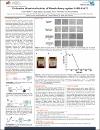Evaluation of antiviral activity of Manuka honey against SARS-CoV-2.
Abstract
Background and aims: In 2020 a global pandemic was declared caused by the severe acute respiratory syndrome coronavirus (SARS-CoV-2). The pandemic is still ongoing and continues to cause considerable mortality and morbidity world-wide and new variants of the virus are emerging. Rapid development and rollout of vaccines for SARS-CoV-2 is in progress to counter the pandemic but has been tempered by the emergence of new SARS-CoV-2 variants, many of which exhibit reduced vaccine effectiveness. To date there is no approved antiviral treatment for coronavirus disease 2019 (COVID-19). Several studies have shown that Manuka honey has virucidal/antiviral effect. Methylglyoxal (MG), a bioactive component in Manuka honey, has antiviral activity in vitro. MG may modify arginine residues in the functional domains of viral spike and nucleocapsid proteins, resulting in loss of charge, protein misfolding and inactivation. The aim of this study was to characterize the antiviral activity of Manuka honey against SARS-CoV-2 in vitro Materials and methods: Wild-type SARS-CoV-2 with titers of multiplicities of infection (MOI) 0.1 and 0.05 were incubated with 2-fold serial dilutions of 250+ Manuka honey (equivalent to 250 to 31 µM) in infection medium (Dulbecco's Modified Eagle Medium + 2% fetal bovine serum + 100 units/ml penicillin + 100 µg/ml streptomycin) for 3 h. Manuka honey treated and untreated control SARS-CoV-2 was incubated with confluent cultures of Vero cells in vitro for 1 h, cultures washed with phosphate-buffered saline and incubated in fresh infection medium at 37°C for 4 - 5 days until 70% of virus control cells displayed cytopathic effect. We also studied the effect of scavenging MG in Manuka Honey with aminoguanidine (AG; 500 µM) on virucidal activity. The antiviral activity of MG was judged by median tissue culture infectious dose (TCID50) assays. Data analysis was by logistic regression. TCID50 (mean ± SD) was deduced by interpolation. Results: Diluted Manuka honey inhibited SARS-CoV-2 replication in Vero cells. SARS-CoV-2 was incubated in diluted Manuka honey in medium at 37°C for 3 h before adding to Vero cells. Manuka honey dilutions down to 125 µM MG equivalents completely inhibited cytopathic effect of SARS-CoV-2 whereas 31.25 µM and 62.5 µM MG equivalents had limited effect. Logistic regression and interpolation of the cytopathic effect indicated that the TCID50 = 72 ± 2 µM MG equivalents for MOI of 0.1. Prior scavenging of MG by addition of AG resulted in virus replication levels equivalent to those seen in the virus control without AG. Conclusion: Manuka honey has antiviral activity against SARS-CoV-2 when incubated with the virus in cell-free media at no greater than ca. 40-fold dilutions of 250+ grade. Anti-viral activity was inhibited by AG, consistent with the anti-viral effect being mediated by MG. Manuka honey dilutions in MG equivalents had similar antiviral effect compared to authentic MG, also consistent with MG content of Manuka honey mediating the antiviral effect. Whilst Manuka honey may inactivate SARS-CoV-2 in cell-free culture medium, its antiviral activity in vivo for other than topical application may be limited because of the rapid metabolism of MG by the glyoxalase system and limited bioavailability of oral MG.
DOI/handle
http://hdl.handle.net/10576/24398Collections
- Biomedical Research Center Research [880 items ]
- COVID-19 Research [924 items ]
- Medicine Research [2051 items ]
- Theme 2: Health and Biomedical Sciences [80 items ]


